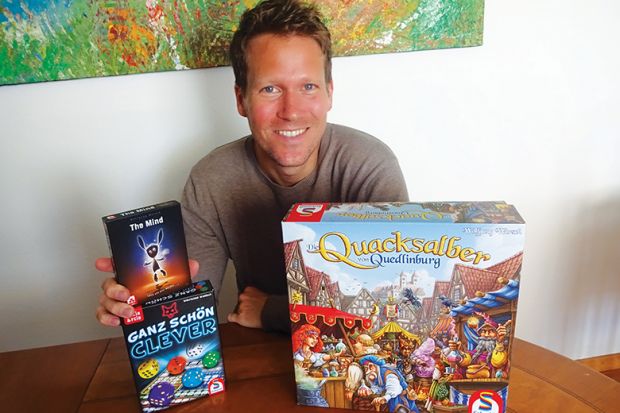Wolfgang Warsch is a former molecular biologist turned board game designer based in Vienna, where he lives with his wife and two children. Since he turned professional in 2018, his games have won numerous prizes and sold about 4 million copies to date.
When and where were you born?
In 1980 in lower Austria, in a very small village.
How has this shaped you?
It shaped my board game career, rather than my scientific career, because living in the mid to late 1980s in Austria, you were quite limited when it came to TV content and computer games.
So it was good for you to be bored growing up?
Absolutely. It is known that it’s very important for small kids to be bored. That’s one of the reasons why smartphones are terrible for a certain age of kids, because they need to be bored to develop their own creativity. I had two sisters, but they were older than me. From early on, I developed a lot of games that I played on my own in my room.
But you were also interested in science as a child?
From an early age, I realised I was interested in weird stuff that other people were not interested in, but it took me 20 years to realise that I really had very strange hobbies when I was young. I was interested in general relativity, without being smart enough to understand the maths behind it. At about 14 years old, I tried to build a perpetual-motion machine out of everyday stuff, like paper and card.
As an undergraduate you went briefly into physics and then, after switching courses, landed in genetics. Why did you go down that route?
I wasn’t that much into genetics – I just wanted to move to Vienna and move away from my parents. Genetics was there [in Vienna], it sounded fun, and that’s how I started.
But you ended up at the University of Cambridge as a molecular biologist – what drew you in?
I got hooked and interested in it – especially the molecular biology. When you really go down to the cellular level, it’s like a living computer. A lot of it is down to logic. If I know a certain thing, and if I’m smart enough and think about it, I can figure out something new and how it works, because it all follows very logical rules – how a cell works, how the genetic code works.
So how did you switch from academia to board games?
I’d been developing board games as a hobby since I was 18 years old. And I did this for a long time, with gaps of one or two years. But I always had this dream, that you could be really that successful that you could make a living from board games. Everyone tells you: don’t try to make it professionally because it’s impossible. So it was just a fantasy that was there.
When was your big break?
At the end of 2017, my fellowship was running out. I was getting kind of bored because I like to try new stuff, and I’d been working in universities for 12 years. I wanted to try something different. I said to my wife: “I want to take two or three months off just to concentrate on board games.” During these two or three months, four of my games came out, and suddenly the reviews came in, and they were surprisingly good! Companies were now coming to me and asking: “Hey, do you have any games for me?” Three of these games were nominated for Spiel Des Jahres – Game of the Year – awards, with one of them winning. From there I could risk the move away from academia to professional board game design.
Are there any parallels between board games and science?
Developing board games, until they get published, is so similar to what you do in basic research. You need a certain knowledge, and you try, just by thinking, to figure out some new hypothesis. It’s the same with board games – you know certain main mechanics that are there and you try to figure out something new. Then, you have to do experiments; you have to test your hypothesis. It’s the same in board games – I build my prototype and go to my test players and test it. The whole process from the first idea to actually getting published can take several months to several years, both in science and games. Are certain strategies too strong? Is there too much luck involved? You are always changing and testing, like in science. Then you start to write the rules and send it to a company – like with an [academic] paper.
How do you get inspiration for a new board game?
I walk every day for at least two or three hours. I come to this state where I shut out everything around me, when I walk or when I’m in the bathtub. I don’t see the world around me any more. Sometimes I really cannot say how much time has passed – sometimes I realise I have been walking around somewhere and don’t realise where I am.
Is being a board game designer lucrative compared with being a researcher?
It depends. It’s like asking: how much do you earn as an actor? Are you Brad Pitt? Or in some small role? I had quite some luck to develop games that sell very well. In total 4 million copies have been sold in the last three years, roughly. You get a margin on every copy sold, but it’s a very, very tiny fraction of what the game costs, and even less than book authors.
Are you still interested in science?
Every now and again, I half-joke with my wife about coming back. I still would enjoy it – perhaps just part time.
david.matthews@timeshighereducation.com
Appointments
Shalini Randeria has been elected president and rector of the Central European University. She is currently rector of the Institute for Human Sciences in Vienna and professor of social anthropology and sociology at the Graduate Institute of International and Development Studies in Geneva. When she succeeds Michael Ignatieff at CEU in July, she will be the first woman to lead the institution since it was founded 30 years ago. Professor Randeria said she wanted to “further the mission of CEU and to give it a new home in Vienna, the city which has welcomed the university so enthusiastically”.
Amaney Jamal has been named dean of the Princeton School of Public and International Affairs. She is currently the Edwards S. Sanford professor of politics and director of the Mamdouha S. Bobst Center for Peace and Justice at the university, and will succeed Cecilia Rouse – now chair of the White House Council of Economic Advisers – when she takes up the new role in September. Princeton president Christopher Eisgruber said Professor Jamal was “a brilliant political scientist, a superb university citizen and a leader respected by her peers”.
Bronwyn Fox has been appointed chief scientist at CSIRO, Australia’s national science agency. She is currently deputy vice-chancellor (research and enterprise) at Swinburne University of Technology.
Chris Fogwill is joining Cranfield University as pro vice-chancellor and head of the School of Water, Energy and Environment. He will make the move from Keele University, where he is head of the School of Geography, Geology and the Environment, in October.
Mark Hayter has been named head of nursing at Manchester Metropolitan University. He is currently professor of nursing and health research at the University of Hull.
John Whelan has been appointed vice-president for human resources at Yale University. He currently holds the same role at Indiana University.
Register to continue
Why register?
- Registration is free and only takes a moment
- Once registered, you can read 3 articles a month
- Sign up for our newsletter
Subscribe
Or subscribe for unlimited access to:
- Unlimited access to news, views, insights & reviews
- Digital editions
- Digital access to THE’s university and college rankings analysis
Already registered or a current subscriber? Login








